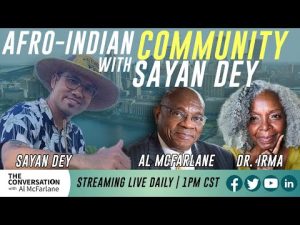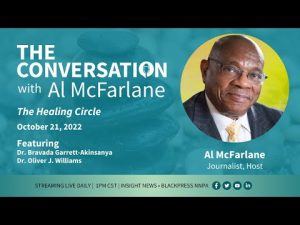Community
Sydney Roberts: New ASUC president shares her goals, inspirations
From a young age, I participated in the Los Angeles Women’s March and read Audre Lorde religiously. The summer before my senior year I took part in Girls State, a week-long immersive summer program that teaches 500 young women from different corners of the nation how to govern imitation cities and states.
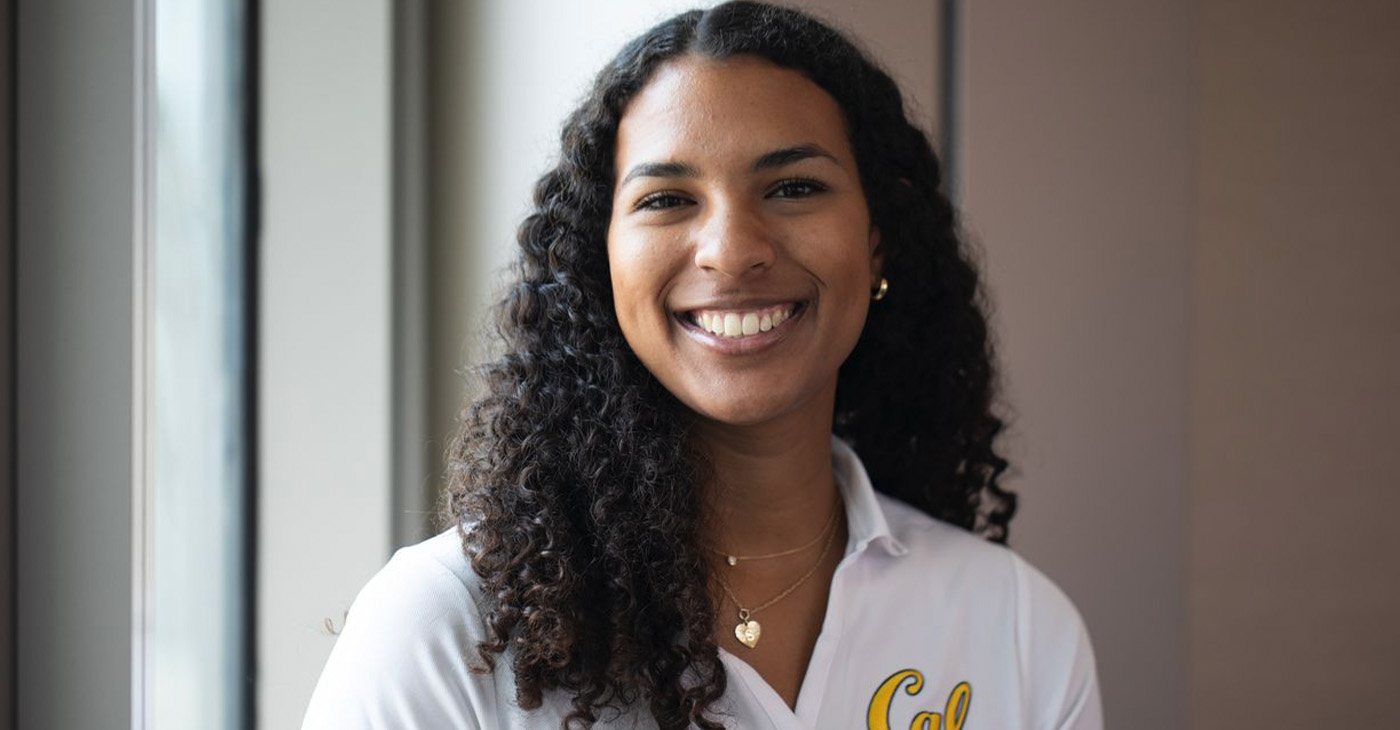
Her first goal is to increase students’ sense of belonging on campus, especially for those who are underrepresented.
By Gretchen Kell
UC Berkeley News
I’m from Long Beach, California, an incredibly diverse and urban coastal city. It is truly a melting pot of cultures, with a large and vibrant settlement of Filipinx and Hispanic people. My friends throughout middle and high school came from these backgrounds, among others. They taught me how beautiful of an experience it is to foster close relationships with people from different backgrounds.
I grew up in a household with my single mom and twin sister. My father joined the Marines right after high school and now works for the U.S. Postal Service. My mother went to college and nursing school and is a public health nurse for the city of Long Beach, specifically working with houseless senior citizens. She is a strong feminist who always encouraged us to pursue higher education and instilled in us that education is key to personal development and professional opportunity.
Growing up in a female-led household also taught me the value of independence. My mother sacrificed a lot to ensure my sister and I had myriad opportunities. Her selflessness shaped my idea of leadership. She went above and beyond to give others more and create joy.
From a young age, I participated in the Los Angeles Women’s March and read Audre Lorde religiously. The summer before my senior year I took part in Girls State, a week-long immersive summer program that teaches 500 young women from different corners of the nation how to govern imitation cities and states.
In the Long Beach Unified School District, I found my passion for research. Although underfunded, like most public systems, I was able to take an AP seminar and AP research capstone. I focused my research on racial profiling after 9/11 and the different opinions about patriotism among baby boomers, millennials and Generation X.
The murder of George Floyd at the end of my senior year was a real turning point for me. People’s reaction to the Black Lives Matter Movement that resurfaced during the summer of 2020 changed my perception of politics and society. I was consumed by grief, but soon turned my emotions into political passion. I wanted to revolutionize how people learned about injustice. I used my social media presence to educate people on the prevalence of anti-Blackness and how to have tough conversations with family members with different ideologies.
I visited UC Berkeley the summer before my senior year of high school. It was my dream school. I was in awe of Cal’s history and culture. Learning that members of the Black Panther Party spoke here, and that the Free Speech Movement ignited here, inspired me. I wanted to be surrounded by changemakers and in a city with a strong culture.
I was on campus to attend the Berkeley Summer Experience, a weekend-long program that paired low-income or underrepresented students with admissions counselors to receive advice on their UC college applications. Although my test scores and leadership roles made me a competitive applicant, I was a student from an underfunded public high school and a family with only one college graduate. I attribute that program to why I was accepted to Cal.
I began attending Berkeley in the fall of 2020. My first year at Berkeley was characterized by the COVID-19 pandemic. It was a struggle to find community, but the ASUC and my sorority, Alpha Phi, aided my endeavor to make personal relationships.
In the ASUC, I served as chief of staff to Chaka Tellem, student body president for an unprecedented two terms. We created an environmental justice education program, sending students to local middle and elementary schools to teach younger generations about sustainability.
We negotiated the biggest discount with Princeton Review for students to receive 20% off all pre-professional test prep review materials. We designed a mentorship program for first-generation, low-income and underrepresented students with the Cal Alumni Association thats fully funded and staffed and has hundreds of participants.
I became chapter president of Alpha Phi in 2021. I aimed to increase involvement, diversify membership and foster belonging. Knowing what it was like to be a Black woman in a predominately white space made me determined to implement initiatives that would transform our chapter into a more inclusive space.
We celebrated culturally significant holidays like Juneteenth, Latinx Heritage Month, Diwali and more. I started an international night, where members decorated a part of our chapter room with items or foods special to their heritage. I also made financial and housing decisions that enabled flexibility for members in need.
This year, I’m a senior, graduating in the spring of 2024, and I feel very honored to be in the role of ASUC president. The presidential race was heavily contested, with five candidates. I ran on platforms of multiculturalism, environmentalism, career readiness, student wellness and campus climate.
My first goal as president is to increase students’ sense of belonging on campus, especially students who have historically felt excluded from higher education. Black students on this campus need more Black students, faculty, and staff.
It’s extremely hard to be the one or one of few Black people in your class, to have no professors who look like you or understand your background, or to know that there are few people within university administrative roles who share the experiences of the Black community.
I took a public policy course during my sophomore year where a small cohort of students went to the Alameda Probation Office to interview formerly incarcerated individuals and probation officers to research re-entry resources.
I also spent the summer before my junior year participating in the SURF SMART program as a research fellow for Caleb Dawson, a Ph.D. candidate in the School of Education. A snippet of our research focus was understanding why Black students, faculty and staff pursue higher education or a career at Cal, and if they felt they had adequate support systems here.
Another goal as ASUC president is to increase pre-professional and academic opportunities on campus. I want all students to feel career-ready before graduation. A final goal is connecting students with the abundance of organizations and departments on campus that assist with their basic needs. Some of the biggest struggles facing students are financial stability, housing security and food security.
This past summer, I gained additional skills in politics working for the Democratic Senatorial Campaign Committee in Wash., D.C., as a research intern in our Cal in the Capitol program. After graduation, I hope to work on a political campaign for the 2024 election or intern for a political consulting or research firm or committee. Later in life, I’m interested in returning to school for a master’s in public policy or/and a J.D.
The most popular question I get today is what my biggest goal is, now that I’m student body president. As a Black woman, I know this university wasn’t designed for me, and there are people in this world who don’t want me to succeed. So empowering others who look like me to take on positions of power and mentoring them in a meaningful and impactful way so they may go on to lead is my greatest hope.
Younger students, many other Black women, have come up to me and expressed how inspiring it is to see a Black woman at the forefront of this university. I tell them, “You’re next.”
California Black Media
California Approves $1.3 Billion to Restructure Community Schools
The State Board of Education and Governor Gavin Newsom announced last week that they have approved $1.3 billion in grants to implement a new school initiative that offers students support outside the classroom. According to a press release dated May 8, State education officials have appropriated funds since 2021 to offer students and their families resources such as health care, mental health support, and social services.

By California Black Media
The State Board of Education and Governor Gavin Newsom announced last week that they have approved $1.3 billion in grants to implement a new school initiative that offers students support outside the classroom.
According to a press release dated May 8, State education officials have appropriated funds since 2021 to offer students and their families resources such as health care, mental health support, and social services. The State’s board awarded $1.3 billion to 288 local education agencies that fund and support 995 schools statewide.
The California Department of Education plans to mobilize resources to help students thrive in school and at home. This initiative includes summer programs, tutoring, and counseling.
Gov. Newsom said that the state is expanding community schools across the state. Students will be offered free meals twice a day, mental health counseling, and after-school programs.
“California is transforming education to make schools a place where every family and student can succeed,” Newsom said.
The state is developing the initiative as part of the California Community Schools Partnership Program (CCSPP), a ten-year plan that promotes equity and quality education for students in California. The state will spend $4.1 billion with its partners including community schools, local counties, government agencies, and nonprofits that provide health, mental health, and social services.
State Board of Education President Linda Darling-Hammond is eager to uplift communities with well-resourced schools and achieve equity in public education.
“We know children learn best when they are healthy, happy, and in a learning environment where they are surrounded by knowledgeable and caring adults attuned to their needs,” Darling-Hammond said.
State Superintendent of Public Instruction Tony Thurmond endorsed current school programs and anticipates promising results as grants are invested in these programs.
“Our Community Schools continue to serve as exemplars of programs that educate the whole child. I am proud to see California continue to be at the forefront of recognizing that student wellness is a cornerstone of learning,” Thurmond said.
The California Department of Education will award a final round of grants to community-based organizations and schools during the 2024-2025 academic year.
Black History
Book Review: ‘The Jazzmen: How Duke Ellington, Louis Armstrong, and Count Basie Transformed America’
Your toes didn’t wait long before they started tapping. They knew what was coming, almost as soon as the band was seated. They knew before the first notes were played and the hep cats and jazz babies hit the floor to cut a rug. Daddy, it was the bee’s knees but in the new book “The Jazzmen” by Larry Tye, if you were the Sheik on the stage, makin’ cabbage wasn’t all that swank.
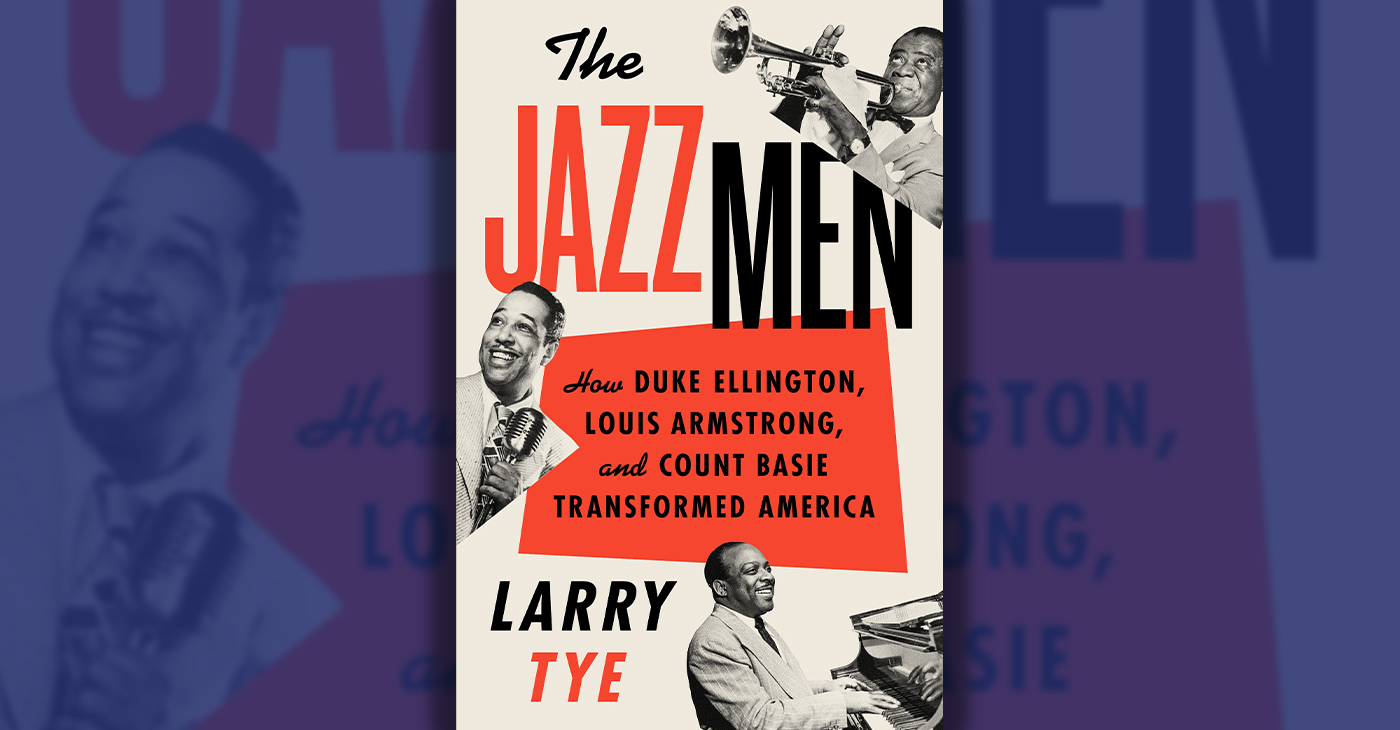
By Terri Schlichenmeyer
Your toes didn’t wait long before they started tapping.
They knew what was coming, almost as soon as the band was seated. They knew before the first notes were played and the hep cats and jazz babies hit the floor to cut a rug. Daddy, it was the bee’s knees but in the new book “The Jazzmen” by Larry Tye, if you were the Sheik on the stage, makin’ cabbage wasn’t all that swank.
Louis Armstrong was born in 1900 or thereabouts in a “four-room frame house on an unpaved lane” in a section of New Orleans called “Back o’Town … the Blackest, swampiest, and most impoverished” area of the city. His mother was a “chippie,” and the boy grew up running barefoot and wild, the latter of which led to trouble. At age twelve, Armstrong was sent to the Colored Waif’s Home for recalcitrant Black boys, and that changed his life. At the “home,” he found mentors, father-figures and love, and he discovered music.
For years, Bill “Count” Basie insisted that he’d grown up with “no-drama, no-mystery, and nobody’s business but his,” but the truth was “sanitized.” He hated school and dropped out in junior high, hoping to join the circus. Instead, he landed a job working in a “moving-picture theater” as a general worker. When the theater’s piano player didn’t come to work one day, Basie volunteered to sit in. He ultimately realized that “I had to get out … of Red Bank [New Jersey], and music was my ticket.”
Even as a young teenager, Edward Ellington insisted that he be treated like a superstar. By then, his friends had nicknamed him “Duke,” for his insistence on dressing elegantly and acting like he was royalty. And he surely was — to his mother, and to millions of swooning female fans later in his life.
Three men, born at roughly the same time, had more in common than their ages. Two of them had mothers “who doted” on them. All three were perform-aholics. And, for all three, “Race … fell away as America listened.”
Feel up to a time-trip back a century or more? You won’t even have to leave your seat, just grab “The Jazzmen” and hang on.
In his introduction, author Larry Tye explains why he so badly wanted to tell the story of these three giants of music and how Basie’s, Ellington’s, and Armstrong’s lives intersected and diverged as all three were near-simultaneously performing for audiences world-wide. Their stories fascinated him, and his excitement runs strong in this book. Among other allures, readers used to today’s star-powered gossip will enjoy learning about an almost-forgotten time when performers took the country by storm by bootstrapping without a retinue of dozens.
And the racism the three performers encountered disappeared like magic sometimes, and that’s a good tale all by itself.
This is a musician’s dream book, but it’s also a must-read story if you’ve never heard of Basie, Ellington, or Armstrong. “The Jazzmen” may send you searching your music library, so make note.
Alameda County
Community Rally Demands Supervisors Merge Recall with Regular Elections
A group of community-based organizations rallied prior to the May 14 Alameda County Board of Supervisors’ vote to persuade the Board to vote to merge the recall election of District Attorney Pamela Price with the regularly scheduled election calendar in November. The groups urged the county to use the funds for healthcare and homelessness relief rather than a special election.
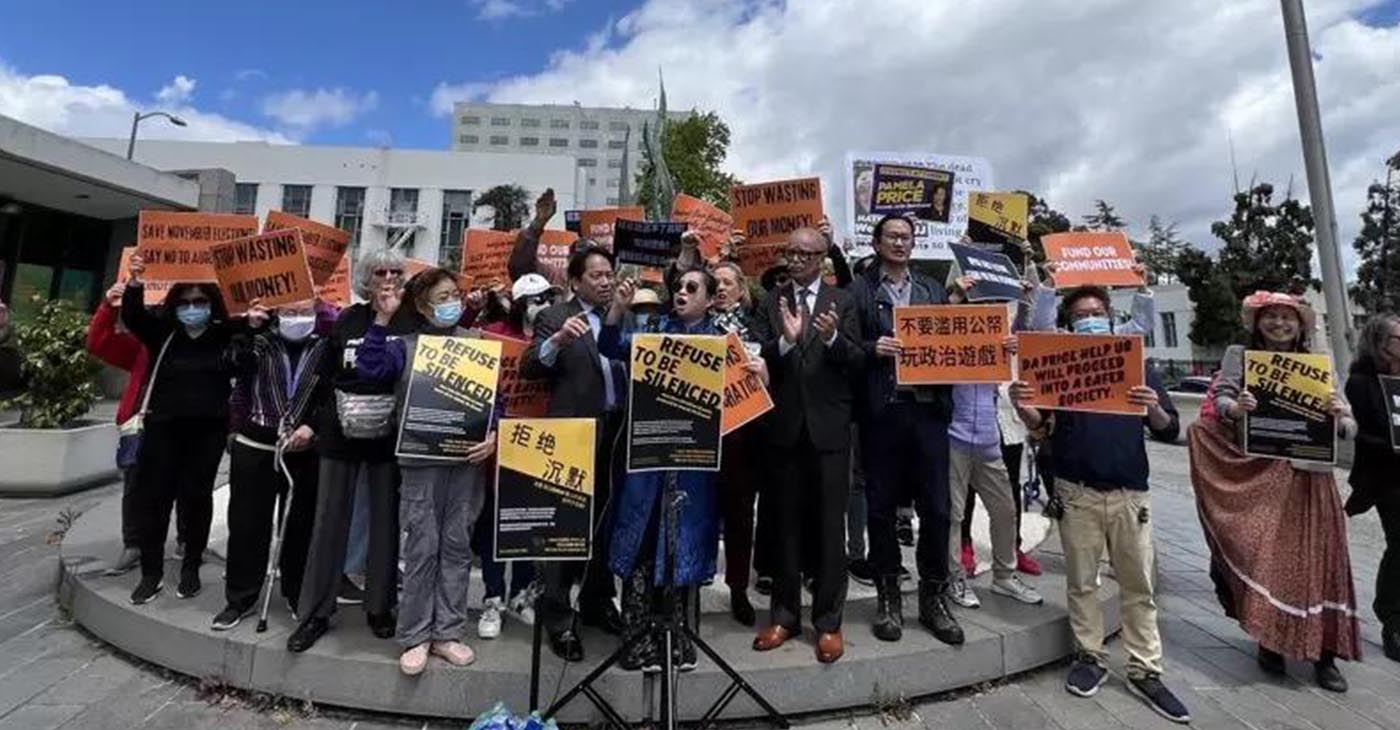
By Post Staff
A group of community-based organizations rallied prior to the May 14 Alameda County Board of Supervisors’ vote to persuade the Board to vote to merge the recall election of District Attorney Pamela Price with the regularly scheduled election calendar in November.
The groups urged the county to use the funds for healthcare and homelessness relief rather than a special election.
Stewart Chen, a member of the Oakland Chinatown Improvement Council, told the Post that he and many members of the community-based participants supported the decision made by the Supervisors.
Chen said, “The voters voting in a special election in September will likely vote the same way in the November election. An extra two months won’t change people’s minds, but it will result in significant savings for the county. During times of financial uncertainty, especially when the county healthcare system is facing a huge deficit, it is unnecessary to waste taxpayers’ money on a special election that can easily wait two months.”
-

 City Government2 weeks ago
City Government2 weeks agoCourt Throws Out Law That Allowed Californians to Build Duplexes, Triplexes and RDUs on Their Properties
-

 Activism3 weeks ago
Activism3 weeks agoOakland Post: Week of April 24 – 30, 2024
-

 Community4 weeks ago
Community4 weeks agoOakland WNBA Player to be Inducted Into Hall of Fame
-

 Community4 weeks ago
Community4 weeks agoRichmond Nonprofit Helps Ex-Felons Get Back on Their Feet
-

 Community4 weeks ago
Community4 weeks agoRPAL to Rename Technology Center for Retired Police Captain Arthur Lee Johnson
-
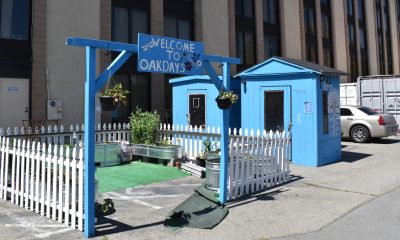
 Alameda County2 weeks ago
Alameda County2 weeks agoAn Oakland Homeless Shelter Is Showing How a Housing and Healthcare First Approach Can Work: Part 1
-

 Business4 weeks ago
Business4 weeks agoBlack Business Summit Focuses on Equity, Access and Data
-

 Bay Area4 weeks ago
Bay Area4 weeks agoMAYOR BREED ANNOUNCES $53 MILLION FEDERAL GRANT FOR SAN FRANCISCO’S HOMELESS PROGRAMS

